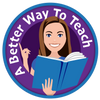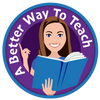If you are wondering what mentor sentences are or if aren't quite sure how to get started using mentor sentences in your classroom, good news: mentor sentences are one of the most powerful tools to teach grammar and writing, and I've got all the details on how to get started with them today!
A mentor sentence is a sentence taken from a published work that you can use in your classroom to highlight the use of language.
Before we get into all the wonderful details of mentor sentences, be sure to grab my FREE unit that includes dozens of mentor sentences and all the slideshows and handouts you need to get started teaching with mentor sentences.
You can use mentor sentences in a lot of different ways depending on your objectives, but typically teachers use mentor sentences in a few of the following ways: observe what's going on in the sentence, consider parts of speech and writing techniques used in the sentence, and imitate the structure of the sentence.
When students observe and emulate great writing, it to help them think differently about their own writing; essentially it gives them a tool they can use when they write.
Aside from an actual mentor to guide you through your teaching journey, mentor sentences may be your most helpful ally as you teach writing.

My love for mentor sentences is deep. Not only did they save me from grammar lessons where I wanted to gouge my eyes out from boredom, but mentor sentences allowed me to bridge great literature with grammar and writing instruction. They showed my students HOW to write like published writers--essentially, they allowed them to interact with language more fully.
Behold, the power of teaching grammar and writing with mentor sentences. Let's jump in.
Here's a sentence from T.C. Boyle's book Tortilla Curtain.

This is a great mentor sentence because it uses language richly, and in a way that most high school students will notice if their attention is drawn to it. However, students likely won't write in this way on their own.
When I use mentor sentences in my classroom, first I ask students what they observe. What words stand out to them? Why?
This is a fantastic sentence to use to focus on vivd action verbs.
I mean look at all those verbs! Threw, plunged, drank, drowned! All in one sentence.
You can also push students a little more by asking what if different verbs were used instead? What if "put" was used instead of "plunged"?
What you're doing is drawing students' attention to the fact that sentences are crafted. They don't generally spill out of a person perfectly. They are thoughtfully created.
After observing the mentor sentence, you can allow students to craft a similar sentence. You can provide part of the sentence for them, requiring them to just focus on the verbs.

If you'd like to see how I use sentence frames, check out this blog post "How To Use Sentence Frames."
Sometimes, if students need more scaffolding before I jump into having them write their own sentences, I'll have the class brainstorm a list of vivid verbs, we'll write them on the board, and they can use those if they need to.
By doing this, students are pushed to try something new with language--using several verbs in a single sentence, as well as using vivid verbs. The structure is given for them which allows them to attempt something a bit new.
Last, I'll give them a prompt and require them to write their own original sentence using vivid verbs.
They don't necessarily have to write their original sentence with the same structure as the mentor sentence, but they still have the mentor sentence as a guide, if they need it. I love using picture and video prompts to engage students for this part of the lesson. If you'd like to see some of my favorite video prompts to use, check out this blog post "3 Excellent Short Films To Use In Your ELA Classroom."
Finally, we evaluate and share.
This may seem unnecessary, but it is soooo good for students to think about their own writing, take pride in it, and share it with others. This is what can flip the switch in a student's brain from "I'm not a good writer" to "Oh, maybe I can be a good writer." And this is huge.
Where can you find mentor sentences?
Well, if you're an English teacher, you're already an avid reader. Make a note of any interesting sentences as you read, and before long you'll have a pretty good list compiled that you can incorporate into your lessons. Once you start thinking in this way, they'll start popping out at you. Before I started teaching with mentor sentences, I never noticed delayed adverbs. But now I see them everywhere!
Another idea is to put your students to work. Tell them to find 3 sentences from their independent reading book that have vivid verbs. Give them a week to find those sentences, so they're not stressed about it.

Once they turn those in, you've got dozens of sentences from the books they are enjoying, and you can use these in your future lessons.
I collect mentor sentences and have put a few online for you to try. Scroll to the bottom of this page to get a few links for mentor sentences I've found.
No-Prep Resources For Mentor Sentences
Once I started using mentor sentences to teach grammar and writing concepts, I couldn't stop. This is (by far) the most effective way I have found to teach grammar. Once I realized how effective it was, I took the concept and ran with it, and I created full curriculums in easy-to-use, completely customizable lessons so that other teachers could implement them with almost zero prep.
I've put it all in the English Teacher Vault, which you can check out here.
Now, that you're no longer wondering what a mentor sentence is, start experimenting with using mentor sentences to showcase grammar concepts and allow your students to emulate these sentences.
Related Articles
How To Teach Adjectives With Mentor Sentences
How To Keep Your Students' Attention During a Grammar Lesson
Sentences That Matter, Mentor, and Motivate from The New York Times
15 Mentor Sentences From Black Authors (abetterwaytoteach.com)
Mentor Sentences From YA Books








Hi Natalie!
I focus on mentor sentences at the secondary level, but I would recommend checking out Jeff Anderson’s book “Patterns of Power” for elementary and middle grades!
Hi Jessica!
I love that you’re considering doing mentor sentences as part of your capstone project.
I don’t have research ready for the early grades (k-2), but I have found quite a bit of research for older grades. Here are a few articles you could start with, but like I said, I don’t know that these would apply to younger grades.
Thanks so much for reading my blog, and let me know if you’d like to connect more!
https://www.nytimes.com/2020/12/03/learning/sentences-that-matter-mentor-and-motivate.html
https://www.edutopia.org/article/how-mentor-texts-provide-valuable-lessons-beyond-writing-instruction
https://www.theatlantic.com/education/archive/2014/02/the-wrong-way-to-teach-grammar/284014/
I love mentor sentences, and I am thinking about focusing my capstone project on implementing them in classrooms grades k-2. Do you have any research articles with data to help support the impact mentor sentences have in the classroom. I have been searching for some well documented sources. Thank you!
I love mentor sentencese, and I am thinking about focusing my capstone project on implementing them in classrooms grades k-2. Do you have any research articles with data to help support the impact mentor sentences have in the classroom. I have been searching for some well documented sources. Thank you!
I would love more information about mentor sentences and how to use in my 5th classroom.
Leave a comment